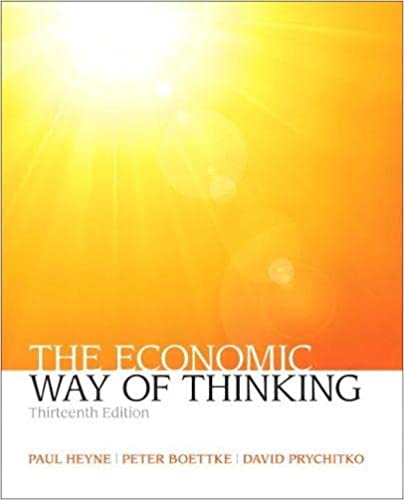
The Economic Way of Thinking 13th Edition by David Prychitko, Peter Boettke, Paul Heyne
Edition 13ISBN: 9780132992695
The Economic Way of Thinking 13th Edition by David Prychitko, Peter Boettke, Paul Heyne
Edition 13ISBN: 9780132992695 Exercise 1
Chuck Waggin owns and operates a small tax-accounting firm, which he runs out of the basement of his home.
(a) The basement was just wasted space until Chuck turned it into an office for his business. He says his firm is more profitable than most tax-accounting businesses because he doesn't have to pay any rent. Do you agree that rent is not a cost of production for Chuck?
(b) Chuck recently turned down an offer to go to work for a larger firm at a salary of $45,000 a year. Chuck's personal income from his business runs about $35,000 a year. Would you say that Chuck's firm is profitable?
(c) Chuck says he likes being his own boss and that he would be willing to sacrifice at least $25,000 a year in income to avoid working for someone else. Does that information change your answer to part (b)?
(d) Chuck recently invested $10,000 of his savings in an office computer. How would you include the effects of this investment in his costs?
(e) Chuck could have earned 12 percent per year on his savings had he not used them to buy the computer. If he had not had these savings, he still would have bought the computer, using a loan from the bank at 18 percent annual interest to finance the purchase. Is the opportunity cost of owning the computer really less for Chuck because he had savings of his own from which to buy it? If Chuck had been required to pay 18 percent interest to the bank rather than giving up 12 percent interest, for what would the additional 6 percent have been a payment? Does Chuck reduce his costs by financing the computer purchase himself?
(a) The basement was just wasted space until Chuck turned it into an office for his business. He says his firm is more profitable than most tax-accounting businesses because he doesn't have to pay any rent. Do you agree that rent is not a cost of production for Chuck?
(b) Chuck recently turned down an offer to go to work for a larger firm at a salary of $45,000 a year. Chuck's personal income from his business runs about $35,000 a year. Would you say that Chuck's firm is profitable?
(c) Chuck says he likes being his own boss and that he would be willing to sacrifice at least $25,000 a year in income to avoid working for someone else. Does that information change your answer to part (b)?
(d) Chuck recently invested $10,000 of his savings in an office computer. How would you include the effects of this investment in his costs?
(e) Chuck could have earned 12 percent per year on his savings had he not used them to buy the computer. If he had not had these savings, he still would have bought the computer, using a loan from the bank at 18 percent annual interest to finance the purchase. Is the opportunity cost of owning the computer really less for Chuck because he had savings of his own from which to buy it? If Chuck had been required to pay 18 percent interest to the bank rather than giving up 12 percent interest, for what would the additional 6 percent have been a payment? Does Chuck reduce his costs by financing the computer purchase himself?
Explanation
(a)Since person CW has opened an office ...
The Economic Way of Thinking 13th Edition by David Prychitko, Peter Boettke, Paul Heyne
Why don’t you like this exercise?
Other Minimum 8 character and maximum 255 character
Character 255


